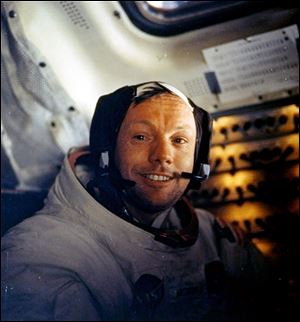
An ode to the first moon walker: Humble, skilled, and one of us
9/9/2012
This July 20, 1969, file photo shows Neil Armstrong on the first voyage to land on the moon.
Like most other Americans of a certain age, I was saddened by the news that Neil Armstrong had passed away. For my generation, there was no greater hero.
But I wondered about younger Americans for whom the first man on the moon might as well have been science fiction. Would they look up from their iPads or stop texting long enough to ponder this native Ohioan's amazing achievement?
I'm afraid the answer for most of them is no.
By the time he died on Aug. 26, Mr. Armstrong had been consigned to the history books, in much the same manner that Charles Lindbergh seemed more abstract than real for my generation. Part of that was Mr. Armstrong's doing: He was proud of his role in the flight of Apollo 11, but he refused to consider it his own or exploit it for personal gain.
However, there is no denying the magnitude of what he and his crew mates — Edwin "Buzz" Aldrin and Michael Collins — accomplished over a week's time in July, 1969. The lunar landing and the safe return of the three astronauts to Earth beat President John Kennedy's end-of-the-decade deadline with six months to spare.
Apollo 11 won the space race for the United States over the then-Soviet Union, and it captivated the planet. For eight days, the residents of Earth essentially became Americans, watching the grainy black-and-white television images beamed from the moon and sharing in the drama. Our country's accomplishment was theirs as well.
July 20, 1969, was a day as remarkable in a good way as the horrors of Dec. 7, 1941, and Sept. 11, 2001, were momentous in an awful way. Yet many Americans would have trouble today naming the date of the first moon walk.
Other American astronauts had flown to the moon, but none had landed on the lunar surface until Apollo 11. So nobody — not NASA and not the astronauts — could be sure what to expect when they glided through the moon's thin atmosphere to the lunar surface.
And that, more than anything else, explains why Mr. Armstrong — quiet, humble, and as skilled as any pilot in the astronaut corps — was chosen to command Apollo 11. NASA didn't want flash; it wanted a steady, calm, unflappable flier at the controls of the Eagle lunar landing module, a decision that paid big dividends.
Noticing that the landing site was strewn with boulders, he flew beyond it to a safer landing spot, burning all but a few precious seconds of remaining fuel. Finally came the historic words: "Houston, Tranquility Base here. The Eagle has landed." The world exhaled.
Many believe that Mr. Armstrong uncharacteristically exercised his prerogative as commander to be the first man out of the capsule onto the moon's surface, thereby making Mr. Aldrin, who followed him out, a footnote in history.
No, Mr. Armstrong explained later, he became the first man on the moon because he was closest to the hatch, not because of any selfish sense of entitlement. I don't doubt he meant it. Practicality trumps hubris; that was Neil Armstrong.
The Auglaize County community of Wapakoneta claims Mr. Armstrong as its own, and rightly so. He spent several years there and graduated from high school there. Today, the Armstrong Air & Space Museum still attracts tourists along Interstate-75.
Less well known is that he and his family also lived in the Wyandot County seat of Upper Sandusky, in a house on North Sandusky Avenue just a few blocks from the county courthouse and a few miles down the road from where I grew up in Sycamore. So please forgive me some proprietary hometown sentiment.
I remember how proud I was when he was named mission commander, and how thrilled I was when The Blade assigned me to cover the mission of Apollo 11 from the Johnson Space Center in Houston. Aside from stowing away in the capsule, nothing could have been more exciting for a young reporter.
Several months after the flight, Wapakoneta threw a big welcome-home celebration for Mr. Armstrong. Master of ceremonies Bob Hope tossed out a few jokes at the expense of the town's favorite son. I remember wondering whether mankind's modest hero would rather be someplace else — on the moon, perhaps.
What Mr. Armstrong and the Apollo program achieved has not been equaled in the half century since. Yet your smart phone is more sophisticated than the computers available to the Apollo explorers.
If you remember July 20, 1969, with an appreciation of its significance, please explain it to someone who wasn't around yet. It's that big a deal.
Thomas Walton is the retired editor and vice president of The Blade. His column appears every other Monday.
Contact him at: twalton@theblade.com